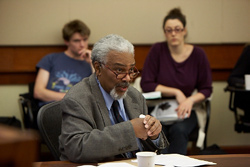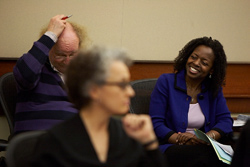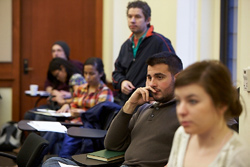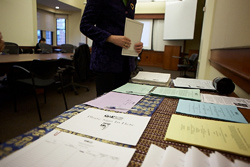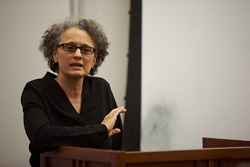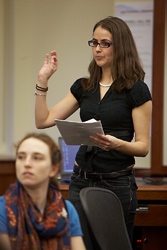Investing in African Education
TC’s connections to
That legacy is alive and well today. On January 26, a group of TC students, faculty and staff gathered on the third floor of the Gottesman Library for an open house hosted by the Center for African Education (CAE) to celebrate the launch of the CAE’s new certificate in African Education, which was recently accredited by the State of New York, and to provide students and faculty with information about the study of Africa at TC.
Available for the first time this spring, the new Certification is granted—currently on a case-by-case basis—to students who have completed 15 or more credits of African-related courses; as well, thesis and dissertation work must address issues relating to
“The rigorous Certificate Program will be highly useful to all students graduating from TC, enhancing students’ understanding of
Bond, who has done decades of field research on African countries, said the certificate “will open up opportunities for employment within the academy and within private and public organizations that work with
Stephanie Bengtsson, the Center’s Coordinator, added that “the certification allows students to have something concrete to represent the exemplary work they are doing.”
In fact, many of TC’s students have worked on African issues as part of internships with aid agencies and non-governmental organizations, such as UNICEF and the Open Society Institutions. An added benefit of such work is that students have the option of receiving credit for internships, which can be applied toward the certification. They also have the opportunity to work closely with faculty who have strong ties to the continent.
“These student-faculty relationships are valuable, since they go beyond the traditional scope of student and advisor,” Bengtsson said.
In addition to information on the new Certification program, as well as other CAE upcoming events, the open house highlighted resources available to TC students interested in
Other speakers included TC faculty whose research and courses are related to African issues, such as Lesley Bartlett, Associate Professor of International and Transcultural Studies; Nancy Lesko, Professor of Education and Maxine Greene Professor; Louis Cristillo, Lecturer in Anthropology and Education; Mary Mendenhall, Lecturer in International and Transcultural Studies; Monisha Bajaj, Assistant Professor in International and Transcultural Studies; Marc Hill, Associate Professor of English Education; and Helen Verdeli, Assistant Professor of Psychology and Education.
Attendees also heard a presentation from Sarah Walsworth Diouf, Assistant Director at
Concluding the ceremonies, Bond said: “Once students have graduated with a Certificate in African Education, they will be well-equipped to combat pessimistic perspectives of Africa in their future careers with a viewpoint that offers hope, as it is based on an intimate understanding of the wonderful diversity that is
Published Thursday, Mar. 25, 2010
